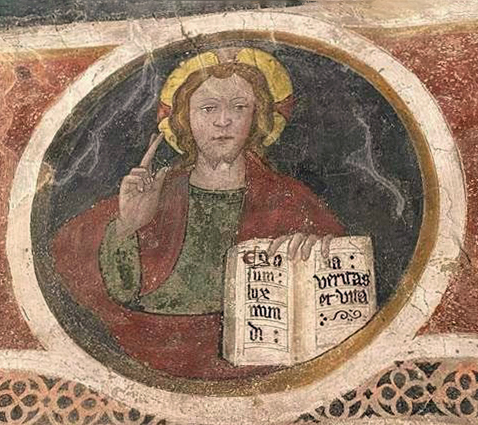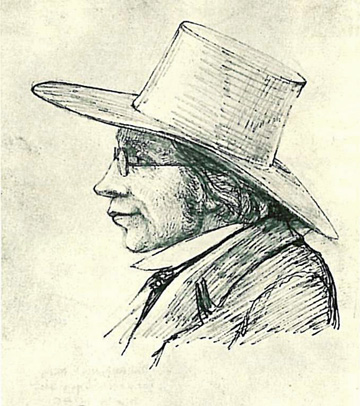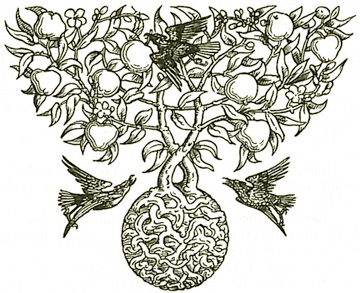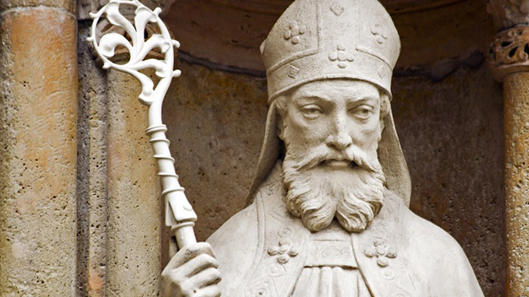November 2021
|
Kierkegaard on Not Worrying
In 1847 Søren Kierkegaard (1813-1855) published in one little
book three discourses or studies on Matthew 6.26 about how God
feeds us in the way he feeds the birds. I think it’s worth
pondering repeatedly:
Be contented with being a human being, with being the
humbled one, the created being who can no more support
himself than create himself. But if a human being wants
to forget God and support himself, then we have worry
about making a living. It is certainly praise-worthy and
pleasing to God that a person sows and reaps and gathers
into barns, that he works in order to obtain food; but
if he wants to forget God and thinks he supports himself
by his labors, then he has worry about making a living.
If the wealthiest man who has ever lived forgets God and
thinks he supports himself, he has worry about making a
living. Let us not talk foolishly and narrow-mindedly by
saying that the wealthy man is free from worry about
making a living and the poor man is not. No, only that
person is free who is contented with being a human being
and thereby understands that the heavenly Father feeds
him – and this, of course, the poor can understand just
as well as the wealthy
(Kierkegaard’s
Writings
15:177).
So be sure to thank God for whatever you have, taking no credit
for any of it, and knowing that whatever it may be, it’s what
God thinks is best for you.
—Pastor
Marshall
(Reprint from
The Messenger
November 2010)
|
|
PRESIDENT'S REPORT...by
Cary Natiello
Dear friends of First Lutheran Church,
This will be my final president’s report to you before Nelly and
I start on our adventure and head south for the winter.
My thoughts and prayers have been with Pastor Marshall these
past few weeks. At
the time of writing this, he remains hospitalized and is still
waiting for test results so his providers can come up with
optimal treatment options.
Recently, Jane wrote to the Jonah Bible Study group…
Ron is still on the "sick-list" this week and asked me to
contact you again. I know he is looking forward to online
classes with you again SOON, but he is still hospitalized. The
last few days he has been walking the halls and working the
crowd! Some things never change...
He has been meeting so many Christians during his hospital stay
who are complete strangers and have offered him support. He
knows that God is watching over him.
Walking the halls, working the crowd, and meeting so many
Christians who are complete strangers….Doesn’t
that sound so much like Pastor Marshall!
God certainly works in mysterious ways.
Janine Douglass, current Vice-President, will assume the
president’s duties beginning November 10th, after the November
9th council meeting.
She has also agreed to be nominated for president for the
2022 – 2024 term. I
am thankful to Janine for her gracious willingness to jump in
and cover the balance of my president’s term.
Serving on the council since 2017 has been a blessing and honor
for me. After my
wife Cynthia passed away in 2016, I was so lost, and I felt no
longer with any purpose.
I prayed for guidance and my prayers were answered by you
all allowing me to serve at First Lutheran Church in a
meaningful and productive manner on the council.
Thank you all for your support.
Lastly, a special prayer for Pastor Marshall…
God’s peace be
with you all.
|
|
STEWARDSHIP
A Stewardship Sampling
Below are excerpts from previous stewardship articles and
sermons that I put together to share with you for this month’s
stewardship article:
·
Stewardship means using our talents to glorify God.
·
A beginning point in looking for ways to best be good stewards
is to listen in prayer and be open to God’s guidance.
·
Search the Bible for answers to stewardship.
Search your hearts for opportunities to grow in your
understanding and application of how we can each better commit
our talents and gifts to the life of the church.
·
We are the trustees of the time, talents, gifts, treasures and
the values of the community we all live in.
·
“As you, Lord, have lived for others, so may we for others
live.” LBW 364.
·
Even though our life is a little rocky right now, we are still
required to be responsible stewards of our commitments which
would include time, talents and money.
·
Politics aside, as Christians, we are called to be stewards of
the earth.
·
I am reminded of the parable of the talents where three workers
were given various amounts of talents to care for – two of them
used it to increase their value for the owner; the third one
buried it where it just got dirty and did not grow.
We are to use what he allotted to us in the best way
possible and for his glory.
·
In our congregation we...honor the beauty and majesty of our
church building as God’s holy house wherein we do far more than
meet together, but primarily behold the awesome splendor of
God’s presence.
·
Faith apart from works is dead. James 2:26
·
A generous person will prosper; whoever refreshes others will be
refreshed. Proverbs 11:25
Cary Natiello, Church
Council |
|
Saint Nicholas Faire
&
Auction
Wednesday through Monday, November 24-29th, 2021
6 pm to 9 pm
For the second
year the Saint Nicholas Faire & Auction will be a Virtual
Fundraiser sponsored by First Lutheran Church of West Seattle
with
all proceeds benefitting
the West Seattle Food Bank.
We continue to chair this event to honor the memory of Scott’s
grandmother Alfhild Schorn, who worked tirelessly during the
Depression to feed the hungry that showed up on her doorstep.
Our goal of $15,000 would surpass prior years and can be
obtained with your help. We
ask you to help in two ways.
First by purchasing items from the Saint Nicholas Faire &
Auction Amazon wish list
https://www.amazon.com/hz/wishlist/ls/37THT2NYXHT62/ref=nav_wishlist_lists_2?_encoding=UTF8&type=wishlist;
we then catalog the items and make them available on the Virtual
Auction site.
Secondly we ask you to attend and bid at the Auction on one or
all six days.
We understand that Thanksgiving weekend can be a busy time; but
we ask that you think about those who will benefit from the
proceeds. Cash
Donations can also be donated on the Auction site, or sent
directly to First Lutheran Church of West Seattle, clearly
marked for the Saint Nicholas Faire & Auction.
Once the Auction site is live we will share the link for you to
pass on to family & friends, the more bidders, the closer we
come to reaching our goal.
With your help we can meet or beat our goal of $15,000, and help
those in need within our neighborhood.
In Christ we can do all things.
-Scott & Valerie Schorn |
|
Misconstruing Miracles
By Ronald F. Marshall
In his high profile
Newsweek article, “Why I Don’t Believe in Miracles,”
Professor Philip Hefner of the Lutheran School of Theology at
Chicago since 1967 stumbles and falls.
In this article which was part of the cover story on miracles,
he argues against miracles and in favor of blessings.
Blessings he proposes are to be preferred over miracles
because they – unlike miracles – do not contravene the laws of
nature.1
Yet in the course of pursuing his startling thesis he is
incoherent, inconsistent and even blasphemous.
As a result he not only weakens his case but also
seriously misconstrues miracles.
Hefner’s article is incoherent because even though he favors
blessings because they – unlike miracles – do not violate the
laws of nature, he still goes on to say these blessings
themselves occur “unexpectedly.”
But how would he know that unless these blessings also
violated what David Hume famously called “the common course of
nature?”2
For them to be unexpected they would have to go against
the ordinary.
Hefner’s blessings would have to push against reality as it
usually goes if they were to manifest the unexpected.
So on Hefner’s own account, blessings would need – just
like miracles do – what Richard Purtill calls a “contrast idea”
in order to be coherent.3
If no expected pattern is violated, then it would be
incoherent for Hefner to say blessings occur “unexpectedly.”
So by insisting that blessings occur unexpectedly he
renders his argument incoherent.
Next his argument is inconsistent.
Hefner in part condemns miracles because they occur
unevenly – leaving many who suffer without the help they so
desperately long for.
This is because many prayers appear to go unanswered.
This uneven distribution he vilifies as “blasphemous”
because it gives God a bad name.
If God helps one he should help all.4
“That’s where the blasphemy comes in,” howls Hefner.
Due to the spotted, selective occurrence of miracles God
comes off looking less loving than he actually is.
Due to our belief in miracles God appears arbitrary and
cruel.
But blessings are no different – even on Hefner’s account!
They too occur sporadically.
Blessings are not uniformly distributed throughout
reality. Feast and
famine strike farmer and entrepreneur alike.
So throwing out miracles for blessings does nothing for
God’s image. “Even
though we cannot…understand why so much of human life involves
sorrow and evil,” Hefner insists we should still “be grateful
and render praise” for whatever blessings come our way.
But this is inconsistent.
It is special pleading.
If irregularity strikes down miracles, then it should –
if one were to be consistent – strike down blessings as well.
But Hefner abandons
consistency, falls on his own sword and unwittingly flays his
argument to pieces.
Finally
Hefner himself blasphemes when he says he has “no confidence”
that his prayers actually “change the course of nature.”
But as Lutherans we are to confess that our prayers are
“assuredly heard and granted."
Whoever denies this “grossly dishonors” God!5
Hefner goes where angels fear to tread all because of the
common experience of not getting what we pray for.
But there is a better way of handling that disappointment
than committing blasphemy.
Down through the generations Christians have learned to “be
exercised in prayer.”6
This means changing your mind about what you pray for.
Then what we want gives way to what God wants.
Longing and praying for one’s heart’s desires trails off
into affirming God’s will instead.
Indeed, “how could the prayer of the children of adoption
be centered on the gifts rather than the Giver?”7
So when we pray for the sick we should not pray for
healing alone. We
should also add that God’s will be done and that we learn to
accept whatever it is.
Our prayers must never go beyond the tax collector’s
humble prayer: God,
be merciful to me a sinner!” (Luke 18:12).
This is because in the end we are all beggars.
Wir sind alle
Bettler is our only motto.8
Thomas Fuller (1608-1661) catches this humility wonderfully well
in his prayer:
“Lord, teach me the art of patience whilst I am well, and give
me the use of it when I am sick.
In that day either lighten my burden or strengthen my
back. Make me, who
so often in my health have discovered my weakness presuming on
my own strength, to be strong in my sickness when I solely rely
on thy assistance.9
The impression Professor Hefner gives in his attack on
miracles is that this prayer would make him choke.
Because this humility is missing from Hefner’s account he
stumbles and falls the way he does.
If he had incorporated humility into prayer we would then
have been able to see how they are answered over and over again.
By missing this he also drains his account of the
following wisdom: “Do not be troubled if you do not immediately
receive from God what you ask him; for he desires to do
something even greater for you, while you cling to him in
prayer.”10
______________________________________________________________________________________________
Endnotes
______________________________________________________________________________________________
1Philip
Hefner, “Why I Don’t Believe in Miracles,”
Newsweek (May 1,
2000) 61.
2David
Hume, “Of Miracles” (1758),
In Defense of Miracles: A
Comprehensive Case for God’s Action in History, eds. R.
Douglas Geivett and Gary R. Habermas (Downers Grove: Inter
Varsity Press, 1997) 33.
3Richard
L. Purtill, “Defining Miracles,”
In Defense of Miracles,
63.
4So
much for Psalm 115:3 which says our “God is in the heavens; he
does whatever he pleases,” and Romans 9:18 which says “God has
mercy upon whomever he wills, and he hardens the heart of
whomever he wills.”
By excising this raw contingency from divine nature Professor
Hefner flattens out God and renders him languid.
All that this leaves us is a useless “prettified God”
[Gerhard O. Forde, On
Being a Theologian of the Cross, (Grand Rapids: Eerdmans,
1997) 85.]
5Martin
Luther, Large Catechism (1529), III.20, 21,
The Book of Concord,
eds. Robert Kolb and Timothy J. Wengert, (Minneapolis: Fortress,
2000) 443.
6Catechism
of the Catholic Church, Revised Edition, (London: Geoffrey
Chapman, 1999) 2737.
7Catechism
of the Catholic Church, 2740.
8These
last words of Luther’s translate: “We are all beggers.”
On this motto see James M. Kittelson,
Luther the Reformer: The
Story of the Man and His Career, (Minneapolis: Augsburg,
1986) 297.
9The
Oxford Book of Prayer, ed. George Appleton, (New York: Oxford,
1985), (437) 130.
10Catechism
of the Catholic Church, 2737.
dialog: A
Journal of Theology
Volume 39, Number 4 •
Winter 2000
______________________________________________________________________________________________
A Moratorium on Miracle-Talk?
______________________________________________________________________________________________
….The words of Psalm 115:3, “God is in the heavens, God does
whatever [he] pleases,” do not go down easily.
There are those who are moved by these words rather to
deny God than to bow down in worship.
This is the experiential and pastoral context in which talk
about miracles takes place today.
By referring to miracles, we assert our belief and our
hope that the God who sends afflictions upon us will also rescue
us. The article I
wrote in the May 1, 2000, issue of
Newsweek, to which
the Reverend Ronald Marshall responded in this journal (Winter
2000, vol. 39:4), elicited fifty letters.
Most were written by lay people and they expressed the
context I have just described – some of them very poignantly.
Six of these letters (5 by Lutherans, 4 by clergy) were
in the slashing mode that Marshall adopted; the rest revealed
the serious probing of men and women who are struggling on their
way, seeking help wherever they can find it.
….Some responses to my original article judged the quality of my
faith according to whether or not I accept miracles.
Some, like Marshall, suspect that I have no faith because
I question miracles.
Others took my skepticism as a sign that my faith was
strong and wholesome.
One letter published by
Newsweek (May 8,
2000) wrote that my “vision implies a God acting always and
everywhere through natural law rather than fitfully and
arbitrarily countermanding natural law.
A professor offering an argument of scientific and
theological sophistication in clear, elegant language –
now that’s miraculous!”
….There are those who express doubts about miracles to their
pastor, priest, or Christian friends, only to be met with the
kind of judgmental invective that Marshall hurled at me.
These people expressed gratitude for my article; it
actually seemed to strengthen their faith and perhaps even their
churchgoing.
When I think about miracle-talk, these experiential and pastoral
issues seem most important.
Frankly, in light of the ambiguities and
misunderstandings involved, I question the usefulness of the
idea of miracle.
More often than not, such talk is not a clear witness to the God
who rescues. I
suggest a moratorium on such talk.
What should we do in a period of moratorium?
Let us promote serious reflection and conversation in our
communities about how we see God at work in our lives and what
forms that work takes.
Let us be as honest as Scripture about our difficulties
and agonies when we reflect on God’s presence in our lives and
in our world. Let
us be specific about those things we want to give God thanks and
praise for: I
suggested in my article that we might use the term “blessing” to
speak of these things.
Let us speak candidly about what things about God
bewilder us and what things might prompt us to cry out with
Psalm 22: “My God, my God, why hast thou forsaken me?”, as well
as the later verses of that psalm: “God heard when I cried out….
Posterity will serve God; future generations will be told and
proclaim God’s deliverance.”
The Reverend Marshall will probably not consider these comments
a worthy response to his piece.
However, I do not see much connection between my original
Newsweek article and
his response to it.
I encourage readers to retrieve my original article and draw
their own conclusions.
P.S. I will gladly
send copies of the article to readers who request it (fax:
773-256-0682; e-mail:
zcrs@lstc.edu).
Careful readers will note several mis-readings in
Marshall’s piece.
For example, I say that blessings are “often” unexpected, not
always. His
insistence that “blessing” refers to events that “go against the
ordinary” puzzles me.
Consider that most births are without calamity, but we
still consider a healthy newborn to be a blessing.
I question Marshall’s tone, as well.
His article represents a far too-frequent attitude in the
church and in our society that one ought not simply disagree on
occasion with certain opinions, but also destroy the persons who
hold them. When
combined with careless analysis, such a stance is dangerous to
all concerned, especially in the church.
–Philip Hefner
dialog: A
Journal of Theology
Volume 40, Number 1
• Spring 2001
(Reprinted from the January 20, 2019 Sunday bulletin insert) |
|
Ephesians 3.10
Monthly Home Bible Study, November 2021, Number 345
The Reverend Ronald F. Marshall
Along with our other regular study of
Scripture, let us join as a congregation in this home study. We
will study alone than
talk informally about the assigned verses together as we have
opportunity. In this way we can "gather
together around the
Word" even though physically we will not be getting together
(Acts 13.44). We need to support each other in this
difficult project. In 1851 Kierkegaard wrote that the Bible is
"an extremely dangerous book.... [because] it is an imperious
book... – it takes the whole man and may suddenly and radically
change... life on a prodigious scale" (For
Self-Examination). And in 1967 Thomas Merton wrote that "we
all instinctively know that it is dangerous to become involved
in the Bible" (Opening
the Bible). Indeed this word "kills" us (Hosea 6.5) because
we are "a rebellious people" (Isaiah 30.9)! As Lutherans,
however, we are still to "abide in the womb of the Word" (Luther's
Works 17.93) by constantly "ruminating on the Word" (LW
30.219) so that we may "become like the Word" (LW
29.155) by thinking "in the way Scripture does" (LW
25.261). Before you study, then, pray: "Blessed Lord, who caused
all holy Scriptures to be written for our learning: Grant us so
to hear them, read, mark, learn, and inwardly digest them, that
we may embrace and ever hold fast the blessed hope of
everlasting life, which you have given us in Our Savior Jesus
Christ. Amen" (quoted in R. F. Marshall,
Making A New World: How
Lutherans Read the Bible, 2003, p. 12).
Week II.
Read again Ephesians 3.10 noting the same word
church. What purpose
does the church serve? On this read 1 Timothy 3.15 noting the
concept bulwark of truth.
What is the truth? On this read John 6.68 noting the line
words of eternal life.
What are these words? On this read also John 3.19 noting the
words judgment,
light,
loved,
darkness,
light and
evil. What is the
impression left by this verse? On this read Isaiah 1.6 noting
the line from the sole of
the foot even to the head, there is no soundness. Read also
Luke 13.3 noting the words
repent and
perish. How does one
repent? On this read Psalm 51.17 noting the words
broken,
contrite,
heart,
God and
despise. Then read
Romans 5.8-9 noting the words
God,
love,
yet,
sinners,
Christ,
died,
justified,
saved,
blood and
wrath. How does Jesus
bloody death do this for us sinners? On this read Galatians 3.13
noting the three occurrences of the word
curse and also
Colossians 2.13-14 noting the words
dead,
trespasses,
God,
alive,
forgiven,
canceled,
bond,
against,
us,
legal,
demands,
set,
aside,
nailing and
cross. Finally read
Romans 3.25, Hebrews 11.1-6 and 2 Peter 1.5-11, noting the many
occurrences of the word
faith. So what is this truth about sin, salvation and faith
that comes from the Lord God Almighty?
Week III.
Reread Ephesians 3.10 noting the word
through. Why does
this happen only through the church and not through, for
instance, recreation, entertainment, education, art or politics?
On this read Ephesians 3.12 noting the word
access. Why is this
limitation imposed? On this read Colossians 1.20 noting the
words reconcile,
peace,
blood and
cross. Access to God
is therefore limited to Christ Jesus because he alone has
overcome the hostility between God and human beings. But why
can’t Jesus’ work of reconciliation be extended to all other
modes of access? On this read Luke 3.22 noting the line
with you I am well
pleased. This says that God has bound himself to Jesus and
no one else – so he cannot share his access with others in whom
God is not well pleased. How can this be promoted while at the
same time avoiding being
haughty as Romans 12.16 says?
Week IV.
Read Ephesians 3.10 one last time noting the term
manifold wisdom. What
is this wisdom and how does the church promote it? On this read
Ephesians 1.17-23 noting the words
wisdom,
Christ,
above,
all,
authority,
power,
head and
church. Is this
manifold wisdom Christ’s rule over all matters in life and
faith? If so, how is this practiced in the church? On this read
Philippians 3.7-11 noting the words
gain,
loss,
surpassing,
worth,
refuse,
righteousness,
not,
own,
faith,
share,
sufferings and
if. What is the drift
of these verses? First, worldly prosperity is not our goal. Next
self-effacing humility is. Finally the easy life free of
suffering and personal uncertainty is wrongheaded. Do these
verses fit in with the
hard, narrow way
in Matthew 7.14? If so, in what ways?
|
|
Announcements
Sunday
Worship ― online at www.flcws.org.
We continue to offer
these abbreviated online liturgies weekly for those unable to
make it to church on Sunday. In
them we are spending our time apart to accentuate Psalm 46:10
about being silent before God.
HOME COMMUNION:
Holy Communion is available for home use for those who are not
able to come to church.
If interested, please call 206-935-6530 or email the
office at
flcws.fd@gmail.com.
PLEDGE CARDS:
Please plan to return your pledge card as soon as possible or
before Monday, the 8th of November.
FOOD BANK COLLECTION
suggested donation for November is holiday foods: turkey, gravy,
cranberries, stuffing, potatoes and pumpkin.
COMPASS HOUSING ALLIANCE:
Until the middle of December, we
are collecting Christmas gift items for the Compass Center for
both men and women.
Some suggested items needed are: Amazon, Target, Fred Meyer and
Walmart gift cards in $25 increments; men’s slippers size 9 &
above, women’s PJ sets size L-3X, 39 hot/cold thermoses, at
least 12 oz., 25 sets of dishware.
Donations can be left at the church office.
100TH ANNIVERSARY BOOK:
The 100th Anniversary
Book is available for purchase.
There is a sample book for you to look at if you wish
before purchase.
The cost is $26 each, which covers the cost of the printing.
Please make your check out to FLCWS with the designation
of 100th Anniversary Book.
The books can be found on the Narthex counter most
Sundays, unless they’ve sold out.
More will be on order.
These books can also be ordered through the church office
by calling (206) 935-6530.
If the office is closed you can leave a message and we’ll
get back with you.
Also, the office email is
flcws.fd@gmail.com.
2021 FLOWER CHART:
A
few more people signing up for Christmas flowers would be
helpful.
Wednesday/THURSDAY Evening Bible ClassES:
All
Bible classes have been put on hold until Pastor Marshall is out
of hospital and able to resume his schedule.
|
|
|
|
________________________________
CHRIST THE KING:
The season of Pentecost and
the
Church Year will end with the celebration of the
Kingship
of Christ at the Sunday morning liturgy
on
November 21st.
On this day we strengthen the belief that Christ is above all
and that every authority is under Him (Eph. 1:21).
We rejoice that the
One
who is, who was and is to come (Rev. 1:8) is the King and Lord
of all!
ADVENT I
Sunday, November 28th
|
 Fenis Castle, Aosta, Italy –
courtesy, Dr. Mark Bertness.
|
|
The Rev. Ronald F. Marshall, Jane Harty and
family, Kim
Lim, Melanie Johnson, Holly Petersen, The Nancy Lawson Family,
Leah and Melissa Baker, Felicia Wells, Marlis Ormiston, Connor
Bisticas, Eileen & Dave Nestoss, Kyra Stromberg, Tabitha
Anderson, The Rev. Randy Olson,
The Rev. Albin
Fogelquist, The Rev. Howard Fosser, The Rev. Alan Gardner, The
Rev. Allen Bidne, Leslie Hicks, Kari Meier,
Yuriko
Nishimura, Eric Baxter, Lesa Christiansen, Richard
Patishnock, Ty Wick, Anthony Brisbane, Susan Curry, Robert Shull
family, Alan Morgan family, Lucy Shearer, Ramona King, Karen
Berg, Donna & Grover Mullen and family, Kurt Weigel, Carol
Estes, Paul Jensen, Tak On Wong & Chee Li Ma, Hank Schmitt, Mary
Ford, Andrea and Hayden Cantu, Dana Gallaher, Jeanne Pantone,
Kevan & Jackie Johnson, Trudy Kelly, Eric Peterson, Gary Grape,
Larry & Diane Johnson, Wendy & Michael Luttinen, the Olegario
Family, Nita Goedert, Mariss Ulmanis, Shirley & Glenn Graham,
Karen Granger, Mike Nacewicz, Mike Matsunaga, Bill & Margaret
Whithumn, The Robert Shull family, Mary Cardona, and
Grace-Calvary Episcopal Church (Clarkesville, GA).
Pray for our professional Health
Care Providers:
Gina Allen, Janine Douglass, David Juhl, Dana
Kahn, Dean Riskedahl, Jane Collins
and all those
suffering from the coronavirus pandemic. Pray for our country, for unbelievers, the addicted, the sexually abused and harassed, the homeless, the hungry and the unemployed.
Pray for the shut-ins that the light of Christ may give them
joy: Gregg &
Jeannine Lingle, Bob
& Mona Ayer, Joan Olson, Bob Schorn, C.J. Christian, Crystal
Tudor, Nora Vanhala, Martin Nygaard.
Pray for our bishops Elizabeth Eaton and Shelly Bryan Wee, our
pastor Ronald Marshall, our choirmaster Dean Hard and our cantor
Andrew King, that they may be strengthened in faith, love and
the holy office to which they have been called.
Pray that God would give us hearts which find joy in service and
in celebration of stewardship.
Pray that God would work within you to become a good
steward of your time, your talents and finances.
Pray to strengthen the stewardship of our congregation in
these same ways.
Pray for the hungry, ignored, abused, and homeless this
November. Pray for
the mercy of God for these people, and for all in Christ's
church to see and help those who are in distress.
Pray for our sister congregation:
El Camino de Emmaus in the Skagit Valley that God may
bless and strengthen their ministry.
Also, pray for our parish and its ministry.
Pray that God will bless you through the lives of the saints:
Saint Andrew, the Apostle.
Pray for this poor, fallen human
race that God would have mercy on us all.
Pray for this planet, our home,
that it and the creatures on it would be saved from destruction. |
|
A Treasury of Prayers O Lord,
blot out, we beseech thee, the transgressions that are against
us, for thy goodness and thy glory, and for the sake of thy Son
our Savior Jesus Christ. Amen. [For All the Saints II:1248, altered] |




